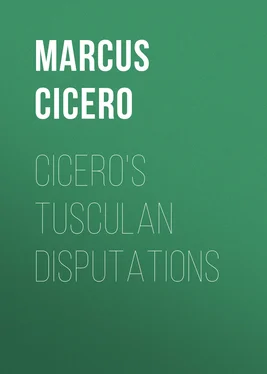Marcus Cicero - Cicero's Tusculan Disputations
Здесь есть возможность читать онлайн «Marcus Cicero - Cicero's Tusculan Disputations» — ознакомительный отрывок электронной книги совершенно бесплатно, а после прочтения отрывка купить полную версию. В некоторых случаях можно слушать аудио, скачать через торрент в формате fb2 и присутствует краткое содержание. Издательство: Иностранный паблик, Жанр: foreign_antique, Философия, foreign_edu, на английском языке. Описание произведения, (предисловие) а так же отзывы посетителей доступны на портале библиотеки ЛибКат.
- Название:Cicero's Tusculan Disputations
- Автор:
- Издательство:Иностранный паблик
- Жанр:
- Год:неизвестен
- ISBN:нет данных
- Рейтинг книги:3 / 5. Голосов: 1
-
Избранное:Добавить в избранное
- Отзывы:
-
Ваша оценка:
- 60
- 1
- 2
- 3
- 4
- 5
Cicero's Tusculan Disputations: краткое содержание, описание и аннотация
Предлагаем к чтению аннотацию, описание, краткое содержание или предисловие (зависит от того, что написал сам автор книги «Cicero's Tusculan Disputations»). Если вы не нашли необходимую информацию о книге — напишите в комментариях, мы постараемся отыскать её.
Cicero's Tusculan Disputations — читать онлайн ознакомительный отрывок
Ниже представлен текст книги, разбитый по страницам. Система сохранения места последней прочитанной страницы, позволяет с удобством читать онлайн бесплатно книгу «Cicero's Tusculan Disputations», без необходимости каждый раз заново искать на чём Вы остановились. Поставьте закладку, и сможете в любой момент перейти на страницу, на которой закончили чтение.
Интервал:
Закладка:
XXV. You may ask, How the case is in peace? What is to be done at home? How we are to behave in bed? You bring me back to the philosophers, who seldom go to war. Among these, Dionysius of Heraclea, a man certainly of no resolution, having learned fortitude of Zeno, quitted it on being in pain; for, being tormented with a pain in his kidneys, in bewailing himself he cried out that those things were false which he had formerly conceived of pain. And when his fellow-disciple, Cleanthes, asked him why he had changed his opinion, he answered, “That the case of any man who had applied so much time to philosophy, and yet was unable to bear pain, might be a sufficient proof that pain is an evil; that he himself had spent many years at philosophy, and yet could not bear pain: it followed, therefore, that pain was an evil.” It is reported that Cleanthes on that struck his foot on the ground, and repeated a verse out of the Epigonæ:
Amphiaraus, hear’st thou this below?
He meant Zeno: he was sorry the other had degenerated from him.
But it was not so with our friend Posidonius, whom I have often seen myself; and I will tell you what Pompey used to say of him: that when he came to Rhodes, after his departure from Syria, he had a great desire to hear Posidonius, but was informed that he was very ill of a severe fit of the gout; yet he had great inclination to pay a visit to so famous a philosopher. Accordingly, when he had seen him, and paid his compliments, and had spoken with great respect of him, he said he was very sorry that he could not hear him lecture. “But indeed you may,” 89replied the other, “nor will I suffer any bodily pain to occasion so great a man to visit me in vain.” On this Pompey relates that, as he lay on his bed, he disputed with great dignity and fluency on this very subject: that nothing was good but what was honest; and that in his paroxysms he would often say, “Pain, it is to no purpose; notwithstanding you are troublesome, I will never acknowledge you an evil.” And in general all celebrated and notorious afflictions become endurable by disregarding them.
XXVI. Do we not observe that where those exercises called gymnastic are in esteem, those who enter the lists never concern themselves about dangers? that where the praise of riding and hunting is highly esteemed, they who practice these arts decline no pain? What shall I say of our own ambitious pursuits or desire of honors? What fire have not candidates run through to gain a single vote? Therefore Africanus had always in his hands Xenophon, the pupil of Socrates, being particularly pleased with his saying, that the same labors were not equally heavy to the general and to the common man, because the honor itself made the labor lighter to the general. But yet, so it happens, that even with the illiterate vulgar an idea of honor is of great influence, though they cannot understand what it is. They are led by report and common opinion to look on that as honorable which has the general voice. Not that I would have you, should the multitude be ever so fond of you, rely on their judgment, nor approve of everything which they think right: you must use your own judgment. If you are satisfied with yourself when you have approved of what is right, you will not only have the mastery over yourself (which I recommended to you just now), but over everybody, and everything. Lay this down, then, as a rule, that a great capacity, and lofty elevation of soul, which distinguishes itself most by despising and looking down with contempt on pain, is the most excellent of all things, and the more so if it does not depend on the people and does not aim at applause, but derives its satisfaction from itself. Besides, to me, indeed, everything seems the more commendable the less the people are courted, and the fewer eyes there 90are to see it. Not that you should avoid the public, for every generous action loves the public view; yet no theatre for virtue is equal to a consciousness of it.
XXVII. And let this be principally considered: that this bearing of pain, which I have often said is to be strengthened by an exertion of the soul, should be the same in everything. For you meet with many who, through a desire of victory, or for glory, or to maintain their rights, or their liberty, have boldly received wounds, and borne themselves up under them; and yet those very same persons, by relaxing that intenseness of their minds, were unequal to bearing the pain of a disease; for they did not support themselves under their former sufferings by reason or philosophy, but by inclination and glory. Therefore some barbarians and savage people are able to fight very stoutly with the sword, but cannot bear sickness like men; but the Grecians, men of no great courage, but as wise as human nature will admit of, cannot look an enemy in the face, yet the same will bear to be visited with sickness tolerably, and with a sufficiently manly spirit; and the Cimbrians and Celtiberians are very alert in battle, but bemoan themselves in sickness. For nothing can be consistent which has not reason for its foundation. But when you see those who are led by inclination or opinion, not retarded by pain in their pursuits, nor hindered by it from succeeding in them, you may conclude, either that pain is no evil, or that, notwithstanding you may choose to call an evil whatever is disagreeable and contrary to nature, yet it is so very trifling an evil that it may so effectually be got the better of by virtue as quite to disappear. And I would have you think of this night and day; for this argument will spread itself, and take up more room some time or other, and not be confined to pain alone; for if the motives to all our actions are to avoid disgrace and acquire honor, we may not only despise the stings of pain, but the storms of fortune, especially if we have recourse to that retreat which was pointed out in our yesterday’s discussion; for, as if some God had advised a man who was pursued by pirates to throw himself overboard, saying, “There is something at hand to receive you; either a dolphin will take you up, as it did Arion of 91Methymna; or those horses sent by Neptune to Pelops (who are said to have carried chariots so rapidly as to be borne up by the waves) will receive you, and convey you wherever you please. Cast away all fear.” So, though your pains be ever so sharp and disagreeable, if the case is not such that it is worth your while to endure them, you see whither you may betake yourself. I think this will do for the present. But perhaps you still abide by your opinion.
A. Not in the least, indeed; and I hope I am freed by these two days’ discourses from the fear of two things that I greatly dreaded.
M. To-morrow, then, for rhetoric, as we were saying. But I see we must not drop our philosophy.
A. No, indeed; we will have the one in the forenoon, and this at the usual time.
M. It shall be so, and I will comply with your very laudable inclinations.
BOOK III.
ON GRIEF OF MIND
I. What reason shall I assign, O Brutus, why, as we consist of mind and body, the art of curing and preserving the body should be so much sought after, and the invention of it, as being so useful, should be ascribed to the immortal Gods; but the medicine of the mind should not have been so much the object of inquiry while it was unknown, nor so much attended to and cultivated after its discovery, nor so well received or approved of by some, and accounted actually disagreeable, and looked upon with an envious eye by many? Is it because we, by means of the mind, judge of the pains and disorders of the body, but do not, by means of the body, arrive at any perception of the disorders of the mind? Hence it comes that the mind only judges of itself when that very faculty by which it is judged is in a bad state. Had nature given us faculties for discerning and viewing herself, and could we go through life by keeping our eye on her—our best guide—92there would be no reason certainly why any one should be in want of philosophy or learning; but, as it is, she has furnished us only with some feeble rays of light, which we immediately extinguish so completely by evil habits and erroneous opinions that the light of nature is nowhere visible. The seeds of virtues are natural to our constitutions, and, were they suffered to come to maturity, would naturally conduct us to a happy life; but now, as soon as we are born and received into the world, we are instantly familiarized with all kinds of depravity and perversity of opinions; so that we may be said almost to suck in error with our nurse’s milk. When we return to our parents, and are put into the hands of tutors and governors, we are imbued with so many errors that truth gives place to falsehood, and nature herself to established opinion.
Читать дальшеИнтервал:
Закладка:
Похожие книги на «Cicero's Tusculan Disputations»
Представляем Вашему вниманию похожие книги на «Cicero's Tusculan Disputations» списком для выбора. Мы отобрали схожую по названию и смыслу литературу в надежде предоставить читателям больше вариантов отыскать новые, интересные, ещё непрочитанные произведения.
Обсуждение, отзывы о книге «Cicero's Tusculan Disputations» и просто собственные мнения читателей. Оставьте ваши комментарии, напишите, что Вы думаете о произведении, его смысле или главных героях. Укажите что конкретно понравилось, а что нет, и почему Вы так считаете.












